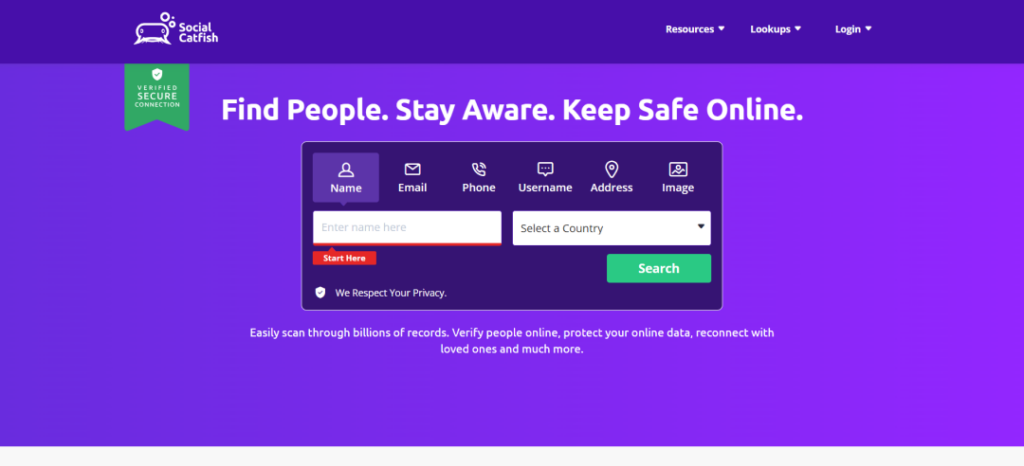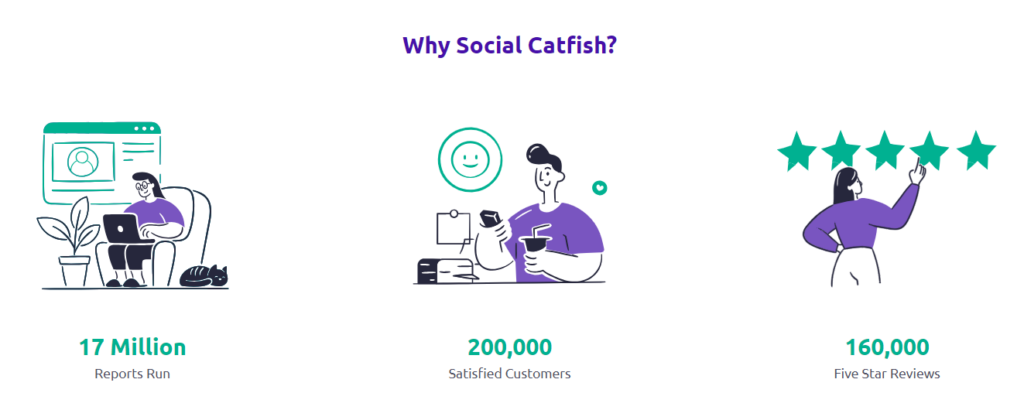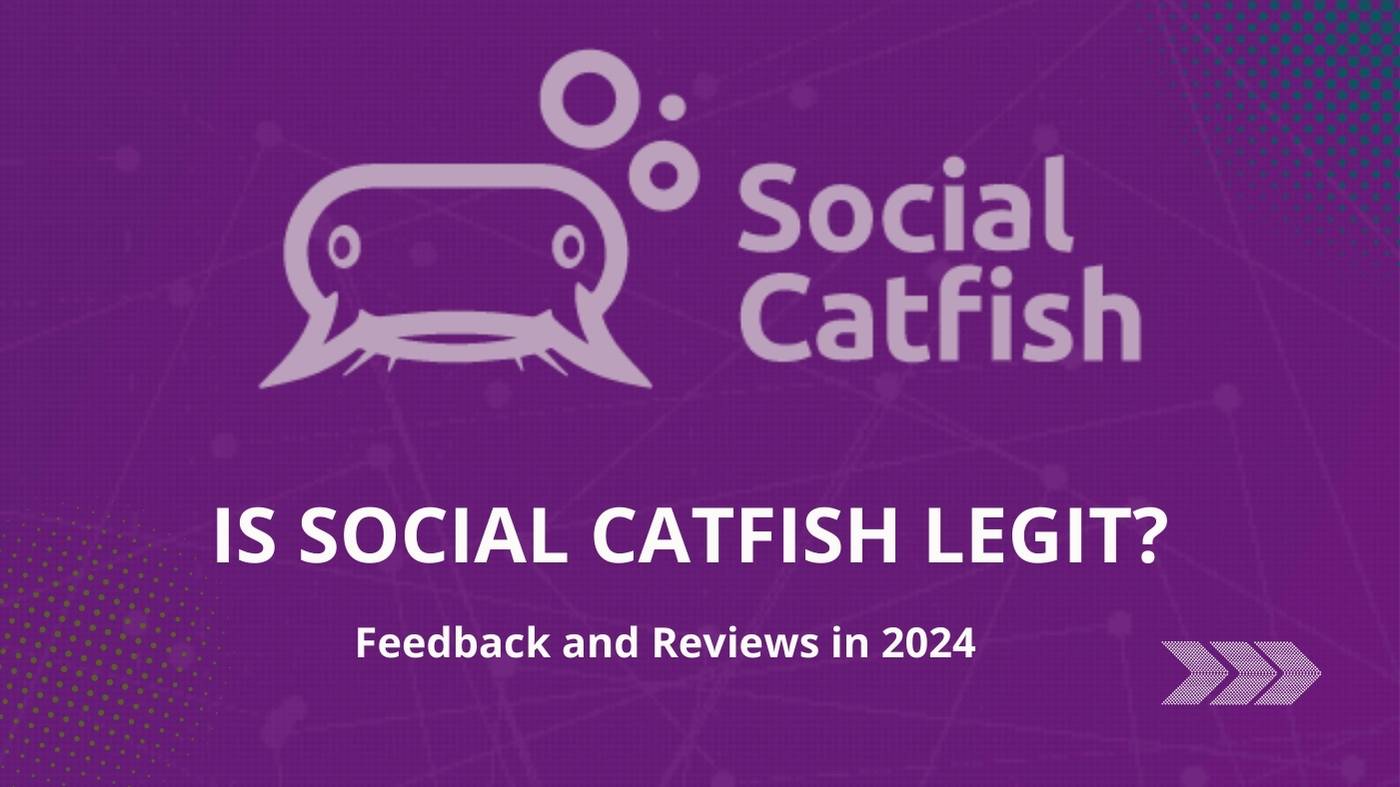Social catfish will still be a common instrument for relationship research and online identity verification in 2024. The effectiveness and legitimacy of such services are more important than ever in light of the rising instances of online fraud and catfishing. To assess Social Catfish’s dependability, this article explores its features and looks at user and expert reviews. Is Social Catfish Legit? We explore how it works, the services offered, its safety and privacy policies, and provide tips for responsible usage.
What’s in this article?
- 1 What is a Social Catfish?
- 2 How Does Social Catfish Work?
- 3 What Services Does Social Catfish Provide?
- 4 Is Social Catfish Safe and Trustworthy?
- 5 Social Catfish’s Commitment to Privacy and Security:
- 6 Tips for Using Social Catfish Responsibly
- 7 Pricing and Packages Offered by Social Catfish
- 8 FAQs:
- 9 Conclusion: Is social catfish legit?
What is a Social Catfish?
Social Catfish is a highly specialized search service with a distinct focus on the verification of online identities and the exposure of potential fraud or deception within virtual relationships. Its services are tailored to individuals who are in pursuit of validation regarding the legitimacy of individuals they engage with on the internet.
This is particularly relevant within the realms of online dating, social networking, and professional networking. The core functionality of Social Catfish revolves around the aggregation of data culled from a multitude of publicly accessible sources.
Through this comprehensive data analysis, the service excels in cross-referencing and corroborating personal information, consequently fortifying the process of identifying counterfeit identities, fraudulent schemes, and instances of catfishing.
The central mission of Social Catfish is to provide an additional layer of security and peace of mind within the realm of online interactions, a domain where the falsification of identity has become increasingly prevalent.

How Does Social Catfish Work?
Social Catfish operates through the utilization of cutting-edge search technologies, employing an intricate process of data aggregation, reverse search functionalities, analysis, and report generation to verify online identities and expose potential deception. Here’s a detailed breakdown of how social catfish function:
Step #1: Data Aggregation
Social Catfish accumulate a vast reservoir of data gleaned from an assortment of online sources and databases. This meticulous data collection forms the foundation of its identity verification process. The platform scours public records, social media profiles, databases, and other publicly accessible Internet sources, amassing a wealth of information.
Step #2: Functionality for Reverse Searches
One unique aspect of social catfish is its capacity for reverse searches. Users can start searches that reveal important details about the veracity of online identities by entering different kinds of data, including names, email addresses, phone numbers, and images. People can upload an image to do a reverse image search, for example, to see if the person in the picture matches the one they say they are.
Step #3: Analysis and Matching
Upon receiving a search query, the algorithms underpinning Social Catfish swing into action. They meticulously scrutinize the data, searching for matches and correlations within the expansive reservoir of information. This comprehensive analysis uncovers inconsistencies and establishes connections between disparate pieces of data, offering valuable clues regarding the legitimacy of an individual’s online persona.
Step #4: Report Generation
Following the intensive analysis, Social Catfish furnishes users with detailed reports. These reports are tailored to provide a comprehensive view of the person under scrutiny, potentially revealing their actual name, associated online profiles, location details, and additional pertinent information, contingent on the data accessible to the platform.
Step #5: User Interface
Social Catfish has made it a priority to make its user interface as friendly as possible so that users of all technical skill levels can utilize its services without difficulty.
Social Catfish is essentially a powerful tool for uncovering online personas, providing a much-needed service at a time when digital exchanges are rife with the possibility of deceit and fraud.
What Services Does Social Catfish Provide?
Social Catfish is an all-inclusive platform that provides a wide range of services intended to confirm online identities and uncover potential fraud or duplicity in digital transactions. These diverse services include:
Reverse Image Search:
With the help of this useful tool, users can upload an image to be examined, and its existence elsewhere on the internet can be found. It is especially good at determining if a profile photo is from a single person or if it has been shared on several profiles, which could mean that the identity is fake or duplicated.
Reverse Phone Lookup:
Users can input a phone number to reveal its rightful owner. This functionality is especially beneficial for identifying unfamiliar callers or corroborating the identity of an individual who has provided contact information.
Reverse Email Lookup:
This feature facilitates the revelation of the person behind an email address, offering assistance in demystifying anonymous or dubious email correspondences.
Name Search:
Users can embark on searches based on individuals’ names, which may yield an assortment of publicly available information associated with that name. This information encompasses social media profiles, public records, and a variety of other details.
Username Search:
This service empowers users to probe for all publicly available data linked to a specific username across different platforms. It proves invaluable in constructing a comprehensive understanding of an individual’s online presence and undertakings.
Catfish Investigation Services:
Social Catfish provides specialized investigative services tailored to the identification of catfishing schemes. These services are particularly beneficial for individuals who harbor suspicions of being deceived in their online relationships or interactions.
Consultation Services:
In instances demanding more intricate or sensitive investigations, Social Catfish extends consultation services helmed by experts capable of guiding users through more profound inquiries.
The gamut of services offered caters to a spectrum of requirements, ranging from simple curiosity regarding an online acquaintance to profound apprehensions about potential duplicity or deception in digital exchanges. By granting access to an extensive compendium of public information and specialized utilities, Social Catfish empowers users to take charge of their online liaisons, safeguarding their well-being and tranquility.

Is Social Catfish Safe and Trustworthy?
Evaluating the safety and trustworthiness of Social Catfish is akin to examining a tool in one’s arsenal, especially for those relying on its services to unveil the veils of online deception. Here are some critical facets to contemplate:
1. Data Accuracy:
Social Catfish, like a diligent investigator, mines data from public sources, typically ensuring a commendable level of accuracy. However, akin to a detective combing through dusty archives, occasional inaccuracies may surface, often due to outdated or erroneously recorded information.
2. Privacy Concerns:
This service, resembling a cautious guardian of secrets, meticulously follows legal standards regarding data privacy and user confidentiality. It confines itself to publicly available data, avoiding any transgression of privacy laws or ethical boundaries.
3. User Feedback and Reviews:
In the Chronicles of 2024, user testimonials generally paint a positive portrait of Social Catfish. Users frequently applaud its prowess in unmasking fraudulent online personas. Nevertheless, akin to a multifaceted gem, experiences can vary, with some encountering the occasional rough edge or inaccuracy.
4. Security Measures:
Social Catfish, much like a fortress guarding treasures, employs standard security measures to shield its digital domain and user data from unwarranted incursions. While no online citadel is impregnable, these measures stand as stalwart guardians.
5. Ethical Usage Policy:
This platform, akin to a moral compass, champions the ethical deployment of its services. It waves a flag of caution against wielding the information it provides for nefarious or unlawful endeavors, adhering to a principled approach to online information retrieval.
6. Transparency:
Social catfish, much like an open book, lays bare its offerings. It defines the boundaries of its services, delineates the origins of its data, and candidly discloses the inherent limitations when relying on publicly accessible information.
Taking these factors into consideration, Social Catfish emerges as a safe and generally reliable ally for those engaged in the pursuit of truth amidst the labyrinthine web of online identities.
| Benefits of Social Catfish | Concerns about Social Catfish |
| 1. Helps uncover scams and fraud | 1. Lack of information provided in some cases |
| 2. Protects user privacy | 2. Limited access to certain features without paid services |
| 3. Provides accurate and helpful results | 3. Varied experiences based on individual cases |
| 4. Assists in finding closure and preventing further scams | 4. Ethical considerations when using personal information |
You can use social catfish without fear or suspicion. But using the services sensibly and protecting your privacy are crucial. You can safeguard yourself against potential fraud and deceit by using Social Catfish’s resources and information to help you make wise decisions about your online relationships.
Also Read : What is Skillshare? Is it worth it?
Social Catfish’s Commitment to Privacy and Security:
Social catfish upholds a robust commitment to the sanctity of privacy and the bastion of security, cognizant of the delicate nature of the information it traverses. Consider the foundational tenets of its allegiance:
1. Compliance with Legal Standards:
Social Catfish, much like an erudite scholar of jurisprudence, meticulously adheres to the tapestry of privacy laws and regulations. It traverses the data landscape within the bounds of legality, revering user privacy and upholding the sanctity of data protection statutes.
2. Use of Publicly Available Information:
The service, akin to that of a discerning archivist, confines itself to the realms of publicly accessible information. It refrains from plumbing the depths of private or classified data, foraying only into the ethically sanctioned corridors of publicly available knowledge.
3. Secure Platform:
Social Catfish, akin to a vigilant guardian of fortresses, bolsters its digital domain and associated platforms with time-honored bastions of security. Encryption and other impregnable ramparts stand as sentinels, warding off any uninvited guests and averting data breaches.
4. User Data Protection:
The service, resembling a vault of secrets, champions the cause of user data protection. It ensures that the hallowed halls of user data, including search histories and personal particulars, remain impervious to misuse and securely guarded.
5. Transparency in Operations:
Social catfish, much like an open book, unfolds the parchment of transparency in its operations. It is forthcoming in illuminating users about the provenance of data, the alchemy of data processing, and the noble intent behind such endeavors.
6. Ethical Guidelines:
The service, akin to that of a sage counselor, extols the virtues of ethical usage. It serenades users with the harmonious notes of responsible information deployment while vehemently decrying any cacophony of harassment, stalking, or illicit pursuits.
In summary, Social Catfish stands as a paragon of integrity in the realm of online identity verification. It forges ahead, wielding its arsenal of data within the sanctified boundaries of legality and ethics, all while safeguarding the citadel of user privacy. Just as a lighthouse guides ships through treacherous waters, Social Catfish illuminates the path toward responsible and ethical data utilization.

Tips for Using Social Catfish Responsibly
1. Understand the goal: verify identities, look into possible scams, or conduct research using social catfish for legal purposes. Do not use it for evil or immoral purposes.
2. Respect Privacy: Individuals’ privacy should be respected even if the information gathered is available to the public. The information should not be used to harass someone or violate their privacy.
3. Remain Inside the Law: Make sure that the way you use social catfish and the information it yields comply with applicable local laws and regulations. Steer clear of anything that might be construed as unlawful.
4. Interpret the information carefully: Be cautious when interpreting the data. Understand that some information might be outdated or inaccurately recorded in public databases.
5. Secure your account: Keep your Social Catfish account secure. Make use of secure passwords, and keep your login information private.
6. Seek Professional Advice When Necessary: If you suspect criminal activity or significant fraud, especially in complex situations, you should think about consulting with professionals or authorities.
By following these tips, users can utilize Social Catfish effectively and ethically, ensuring they benefit from its services while upholding high standards of privacy and responsibility.
Pricing and Packages Offered by Social Catfish
Different pricing options are available on Social Catfish to accommodate a range of needs and budgets. For those who need a thorough background check or just a basic search, Social Catfish offers a package that works for them. An explanation of their costs and related services is provided below:
| Service | Pricing |
| Basic Search | Free |
| Reverse Phone Lookup | $9.95 per search |
| Reverse Email Lookup | $9.95 per search |
| People Search | $19.95 per search |
| Full Background Check | $79.95 per search |
As prices are subject to change, it is recommended that you visit the Social Catfish website to ensure you have the most recent information. Watch out for exclusive offers, as they occasionally run promotions or discounts.
Social Catfish provides a range of pricing options to make identity verification and identifying potential fraud and scams accessible and affordable for everyone. They provide you with the resources and knowledge to help you efficiently, whether you need a fast search or a more thorough investigation.
FAQs:
Ans: While Social Catfish strives for accuracy by using various data sources, the accuracy of its results can depend on the quality and recency of public data.
Ans: Social Catfish offers some free services, but full access to its features may require a subscription or payment.
Que: Can I use Social Catfish for background checks?
Ans: Social catfish can provide information useful for informal background checks, but it is not a substitute for professional background check services, especially for employment or legal purposes.
Ans: Users can conduct searches using names, email addresses, phone numbers, or images. Social Catfish then scans through public records and online sources to provide information that matches the search query.
Ans: No, Social Catfish does not provide exact location tracking. It can offer location-related information based on public data, but it respects user privacy and legal boundaries.
In conclusion, Social Catfish appears to be a legitimate and effective tool for verifying online identities and investigating potential digital deceptions. With its extensive database, variety of search functionalities, and commitment to privacy and security, it provides users with a reliable means to navigate the complexities of online interactions. User feedback and reviews in 2024 largely endorse its accuracy and usefulness. While no service can guarantee absolute precision, Social Catfish’s adherence to legal and ethical standards makes it a trustworthy resource. Responsible usage, coupled with an awareness of its limitations, allows users to harness its potential effectively, making it a valuable asset in the digital age.

